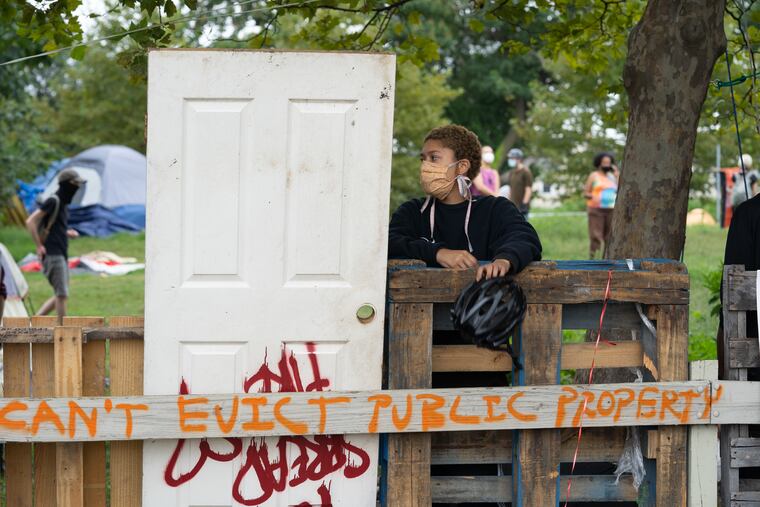Parkway encampment agreement opens door to fix Philly homelessness with vacant properties | Editorial
A long history of inadequate affordable housing coupled with the urgency of a pandemic-related eviction crisis has spurred new thinking -- and organizing --across the country for housing solutions.

After more than three months, leaders of the protest encampment on the Benjamin Franklin Parkway reached an agreement with the city Tuesday. The encampment will close by the end of this week and its organizers will form a new community land trust that will own 50 vacant properties that will be transferred by the city and the Philadelphia Housing Authority. The city also agreed to set up two tiny-house villages in the coming months.
The agreement still needs to be executed — the encampment needs to close, community land trust formed, and properties transferred — but both sides deserve much credit.
In other cities, closure of similar encampments led to violent clashes between police and protesters, leading national experts to call the peaceful and productive resolution of the encampment in Philadelphia “unprecedented.” Earlier this month, the smaller Occupy PHA encampment on Ridge Avenue reached a similar agreement with the city.
The encampment in such a central location has been an effective protest tool to shed light on the way racism and homelessness are inherently related in Philadelphia due to policy choices, such as restrictive covenants, redlining, and predatory lending practices. It exposed how affordable housing options are both inadequately resourced and not equipped to help those with minimal or no income, leaving them to the shelter system that includes restrictions that discourage some from seeking help.
Philadelphia’s effort to prevent homelessness is based on renter and eviction protections and a system of shelters and temporary housing. The protest encampment highlighted the gaps of this system — how the patchwork of protections and the under-resourced system contributes to a revolving door of homelessness. The agreement between the city and encampment leadership showed that a different approach, that allows for long-term stability, is possible.
» READ MORE: Homeless encampment on Parkway ties Black Lives Matter to housing | Editorial
A long history of inadequate affordable housing coupled with the urgency of a pandemic-related eviction crisis has spurred new thinking — and organizing — across the country for housing solutions. Princeton sociologist Matthew Desmond recently reported in the New York Times on a group of Minneapolis tenants who joined together when their neighbor faced eviction, organized, and, after a long fight, bought the buildings from their landlord. Desmond writes: “I saw the tenants reimagine — and then reinvent — what stable, affordable housing could look like in their community.”
The agreement in Philadelphia could lead to a similar outcome.
High inventories of vacant lots and properties have plagued the city for decades — tied to crime, reduced property values, and overall negative impact on health. Transferring vacant properties, and eventually lots to develop, to community land trusts can create a path for unhoused individuals to own their home, and help stabilize neighborhoods. Instead of developers directing the future of a neighborhood by bidding on city- or PHA-owned lots, people can help shape their own communities through a land trust with democratized decision-making .
A process starting with 50 properties could become a new tool for addressing homelessness and housing affordability. With an eviction avalanche looming, a municipal budget crisis, and no new federal recovery in sight, it is critical that we utilize all the resources we have — including the city’s stock of vacant lots and properties.